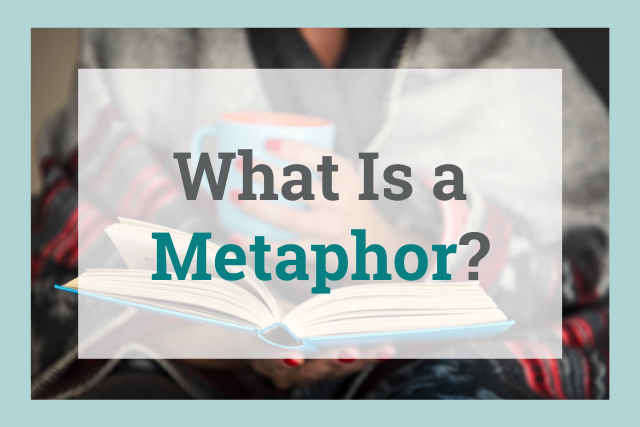Metaphors

A metaphor is a figure of speech that describes something (an object or an action) in a way that isn’t literally true, but uses comparison or symbolism to describe something. Metaphors are a great way to add more color to your writing!
Metaphors show up all over the place, especially in poetry and literature. They help writing come alive and can enhance your work by creating vivid imagery.
Here are three popular examples of metaphors:
- Love is a battlefield.
In this metaphor, love is compared to a battlefield. This simple phrase shows that love can be very challenging – even deadly!
- You light up my life!
This metaphor shows that the person being addressed is a positive influence in the speaker’s life.
- He broke my heart.
As much as it may feel like it, your heart isn’t ever actually broken – you’re just feeling a lot of pain.
Using metaphors.
Aristotle said a metaphor was “the act of giving a thing a name that belongs to something else.” It allows you to pack a powerful punch in a few words. Your reader can take their full understanding of one thing and apply it to another thing. By writing, “my cubicle is a prison,” your reader understands how you feel about your job. With just that one word they know you feel trapped, unhappy, desolate.
Think of some of the most famous metaphors and how full they are of meaning.
- "Conscience is a man’s compass." – Vincent Van Gogh
- "Books are the mirrors of the soul." – Virginia Woolf
- "You ain’t nothin’ but a hound dog." – Elvis Presley
You probably already use metaphors in your everyday language without a second thought:
- The boys were glued to their seats!
- She was a bull in a china shop.
- The email was the smoking gun in the investigation.
Metaphors enliven ordinary communication. You’re so used to seeing the same words and phrases over and over again that when someone comes out with a brilliant metaphor, we all perk up and take notice. It is an art form and you should practice often to get good at it.
Here are several types of metaphors, some you should try and some you shouldn’t:
1) Extended metaphor.
This is a metaphor that’s sustained for more than just a word or phrase.
- The boss snatched at her report, devoured it as quickly as possible, and then, looking around for more prey, darted across the aisle to her co-worker’s desk.
2) Implied metaphor.
This is using a metaphor in a less direct manner.
- Harry swelled and, with his prickly spines, wasn’t nearly as approachable as he had been earlier.
Rather than say, “Harry was a pufferfish,” this implies he becomes a pufferfish when he gets riled up.
3) Mixed metaphor.
Be careful when using mixed metaphors. Used correctly, they can be quite humorous. Used unconsciously, they’ll detract from your writing enough that your reader will put the book down.
It’s raining turtles and hares.
Let’s tie up the red tape and get out of here.
4) Dead metaphors.
These are the clichés of metaphors, those that have been used too often and have lost their punch.
The paper was white as snow.
She had a heart of stone.
Don’t use dead metaphors. Find another, more clever way of saying something is as white as snow or has a heart made of stone. To root out dead metaphors in your work, make sure to use our Clichés and Redundancies Check.
Note: Metaphors aren’t similes. A simile is comparing something using the words like or as:
- Simile: Her teeth glittered like shards of glass when she smiled.
- Metaphor: Her teeth were shards of glass when she smiled.
How to create fantastic metaphors.
Metaphors let your creativity and imagination loose. Here are steps you can take to help you create a fantastic metaphor.
1. Choose a character, object, or setting.
Say, for example, you’re going to write a metaphor about a soccer goalie. What are a goalie’s defining characteristics? A goalie should be stalwart in the face of oncoming offense. Goalies should be a wall that stops someone from scoring. When you think about your character, object, or setting, think of it with all of your senses (e.g. sight, sound, smell, etc.).
2. Focus on a particular scene you’re describing.
Identify its characteristics. Let’s say our goalie is in the championship game facing his arch nemesis. And let’s say the nemesis is a large, physical specimen. What is the mood you’re trying to set here? Keep that in mind while describing your scene.
3. Now think of some other objects that share characteristics you identified in Step 1.
Keep in mind how the specific situation reveals your character. Is our goalie situation like David vs. Goliath? No, that’s been done too many times. Perhaps the goalie is like a baby seal with a deadly shark circling closer and closer. No, that’s not in character with who we want our goalie to be. We want him stalwart in the face of his opponent. How about comparing the goalie to unexplored ocean depths? That might give you plenty of character ideas about your goalie and his deeper thoughts and ideas.
4. Take your metaphor and expand on it.
It’s not enough just to compare the goalie to the ocean deep; emphasize it beyond a single word to create an image that rounds out the specific characteristics.
The goalie, pressured from all sides with unrelenting force, slipped deeper into his pocket, finding swells below the surface that buoyed him along and kept him focused on the predator that was descending.
Okay. That’s one option off the top of my head. You can probably do better!